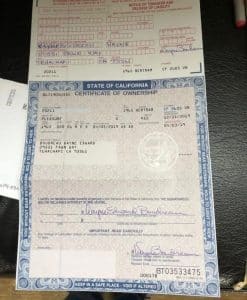Have you ever wondered about that string of numbers and letters on your car’s paperwork? That’s your car’s title number, and it’s more important than you might think. Whether you’re a seasoned driver or new to the world of car ownership, understanding what a title number is and why it matters can save you time and headaches down the road. Let’s dive into the world of car title numbers and unravel this automotive mystery together.
The Basics: What Exactly is a Car Title Number?
A car title number is a unique identifier assigned to your vehicle by your state’s Department of Motor Vehicles (DMV) or equivalent agency. Think of it as your car’s fingerprint – no two are exactly alike. This number is typically found on your car’s title document, which serves as proof of ownership.
Why Does My Car Need a Title Number?
You might be wondering why your car needs its own special number. Here are a few key reasons:
- Identification: It helps distinguish your car from millions of others on the road.
- Ownership tracking: It allows state agencies to keep tabs on who owns what vehicle.
- Legal protection: It helps prevent fraud and theft by providing a clear chain of ownership.
The Anatomy of a Car Title Number
Car title numbers aren’t just random strings of characters. They often follow a specific format set by each state. While the exact format can vary, here’s a general breakdown of what you might see:
- State identifier: Often the first characters indicate the state of registration.
- Year: Some states include the year of registration in the title number.
- Sequence numbers: A series of numbers unique to your vehicle.
- Check digits: Some states add extra numbers to help verify the title’s authenticity.
Example: Decoding a Sample Title Number
Let’s say you have a title number that looks like this: TX12345678. Here’s what it might mean:
- TX: Registered in Texas
- 12345678: Unique sequence number assigned to your vehicle
Remember, this is just an example. Your state’s format might look quite different!
Where Can I Find My Car’s Title Number?
Now that you know what a title number is, you’re probably wondering where to find yours. Here are the most common places to look:
- Vehicle title document: This is the most obvious place. Look for a field labeled “Title Number” or something similar.
- Registration card: Some states include the title number on your registration card as well.
- Insurance documents: Your insurance company might have your title number on file.
- State DMV website: Many states allow you to look up your title number online using other vehicle information.
Pro tip: Always keep your title document in a safe place. It’s much easier to reference your title number than to request a new title if you lose it!
Why Your Car’s Title Number Matters
You might be thinking, “Okay, I know what it is, but why should I care?” Here are a few scenarios where knowing your car’s title number can be crucial:
Selling Your Car
When you’re ready to part ways with your trusty vehicle, having the title number handy can speed up the sale process. Potential buyers might want to run a vehicle history report, which often requires the title number.
Dealing with the DMV
Let’s face it, nobody enjoys a trip to the DMV. But having your title number ready can make many DMV transactions smoother, from renewing your registration to transferring ownership.
Insurance Claims
In the unfortunate event of an accident or theft, your insurance company might ask for your title number as part of the claims process.
Common Questions About Car Title Numbers
As you navigate the world of car ownership, you might encounter some questions about title numbers. Let’s address a few common ones:
Can Two Cars Have the Same Title Number?
No, each title number is unique to a specific vehicle. Even if you buy the same make and model as your neighbor, your cars will have different title numbers.
What If I Can’t Find My Title Number?
Don’t panic! If you can’t locate your title number, you have options:
- Contact your local DMV: They can help you look up your title number or request a new title.
- Check your loan documents: If you financed your car, your lender might have the title number on file.
- Use a vehicle history service: Some services can find your title number using your VIN (Vehicle Identification Number).
Does My Title Number Change If I Move to a New State?
Yes, typically when you move to a new state and register your vehicle there, you’ll receive a new title with a new title number specific to that state.
Protecting Your Car’s Identity
Your car’s title number is part of its identity, much like your Social Security number is part of yours. Here are some tips to keep this information safe:
- Store your title document securely, preferably in a fireproof safe or safety deposit box.
- Don’t share your title number unnecessarily. Only provide it to trusted parties when required.
- If you suspect your title has been stolen or compromised, contact your local DMV immediately.
Wrapping Up: The Importance of Your Car’s Title Number
While it might seem like just another bit of bureaucratic paperwork, your car’s title number plays a crucial role in your vehicle’s identity and your ownership of it. From facilitating sales to simplifying DMV visits, knowing and understanding your car’s title number can make various aspects of car ownership smoother.
Remember, whether you’re a daily commuter, a weekend road-tripper, or even a bus driver fascinated by all things vehicular, your car’s title number is an important piece of information to have on hand. It’s a small detail that can make a big difference in your automotive journey.
So the next time you’re shuffling through your car documents, take a moment to locate and memorize that unique string of characters. Your future self might thank you when you’re breezing through your next vehicle-related transaction!
Order A Customised Car Title






